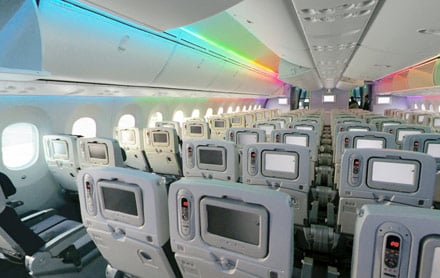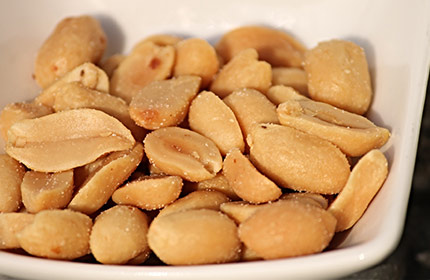How to fly with a nut allergy

Flight Search in Progress
Scanning the skies for available flights...
- Airlines will always try to sit children with their parents (subject to check-in)
- Some airlines will allow travel for unaccompanied minors. Please email us to check.
- The fare is based on the child's age on the date of travel.
- More detailed information can be found here Traveling with children
- Most airlines will let infants travel with their parent(s) for free. However some airlines will charge up to 10% of the adult ticket price. Click on 'Price Breakdown' to find out more.
- If you are pregnant, but due before the flight departure date, please contact us once your baby is born and has a name. We can then add him/her to your ticket.
- Infants will not be given a seat. The airlines expect parents to travel with them on their lap.
- Airlines regard infants as being under 24 months old.
- The fare is based on the child's age on the date of travel.
- More detailed information can be found here Traveling with children
Flying with a Nut Allergy
Flying can be a stressful and nerve-wracking time, and if you are flying with a nut allergy then the levels or stress are increased along with the risk. This guide provides tips on travelling with a nut allergy
Tips for travelling with a nut allergy
![]()
Check airline policy
No airline has the same policy regarding passengers with nut allergies. The best idea is to check the airline’s nut policy with them directly to see their suggestions on what you can do to help alleviate your risk to having a reaction on your flight.
Make the airline aware of your allergy
Contact the airline in advance of flying and make them aware you have a nut allergy at the time of booking. Also make staff aware at the time of flying, including ground staff that may allow you to board the plane early, and also cabin crew so that they may make an announcement and do everything they can to minimise risk such as not serving nuts during the flight.
Order a special meal
Some airlines can cater to your allergy and provide a nut-free meal as part of their service. However, if they will not provide this, you can always bring your own food onto the plane with you. Read our guide here to see which foods you can fly with.
Bring Medical Documents
Some airlines state that they require documentation of your allergy, but it’s usually a good idea to bring it with you even if the airline do not state they need this. Usually, this will be a doctor’s note stating you are fit to fly and/or your medical history.
Pre-board and Clean

After gaining permission, it is a good idea to pre-board the plane to clean your seat and surrounding areas with your own equipment to make sure it is free from allergens.
Bring Medication
Make sure you bring plenty of medication, such as an EpiPen, with you so that you will be able to be treated, should you suffer from an allergic reaction.
Additional Advice
Some passengers with nut allergies prefer to select a seat at the front of the plane as this reduces the exposure to the rest of the cabin. Additionally, some passengers prefer to fly on a red-eye flight, as this means you’ll be on one of the first flights of the day after a deeper clean at the end of the previous days operations.
Why is being Nut-free important on Planes
Other passengers should be cautious with their nut consumption to benefit those passengers with a nut allergy. Passengers who have nut allergies have higher risks of having a reaction during a flight due to a number of different reasons:

Other passengers:
Although passengers are under no obligation to eat the food they are provided with, and the majority of airlines will allow passengers to bring their own food with them on the plane, however, this does not mean that passengers can be in an allergen-free environment. This is even more important on a plane, compared to other places due to the close proximity to others.
Not every food item is completely nut free:
Although many airlines now ban nut products in the complimentary snacks they offer, the complimentary hot meals that they provide can not always be guaranteed that they will be free from all nut produce, as some ingredients may have been produced in environments which contain nuts. This is especially more problematic on airlines than in other locations, because of the number of different suppliers for each of the different meals served onboard. Some airlines, however do serve a allergen-free meal.
Being in the air:
If a passenger does suffer from an allergic reaction whilst on board a plane, the fact that they are in the air, away from medical services, is also a problem. This can be alleviated by passengers making sure that they bring enough medicine, such as an EpiPen, with them on their flight to help should anything go wrong.
Airline policies for nut allergies
As mentioned, different airlines have different approaches to nut allergies. Use this information as a guide, as it is correct at time of writing but may be changed by the airline. We always recommend contacting the airline directly to see their guidelines and policy.
British Airways Nut Policy
British Airways meals do not contain peanuts, but may be produced in a facility which does handle peanuts. Therefore they are unable to provide a completely nut-free meal. Tree nuts (walnuts and cashews) may be offered as part of the in-flight menu. Sale of nuts as snacks can be suspended on request, as well as making an announcement to other passengers.
Emirates Nut Policy
Emirates serve nuts on all flights, as either a snack or in a meal. Emirates recommend passengers with nut allergies to bring their own food. They will not restrict other passengers consuming nuts on their flights.
EasyJet Nut Policy
EasyJet are unable to guarantee nut-free environment. Nuts are served onboard but can be suspended if cabin crew notified when boarding.
Qantas Nut Policy
Cannot guarantee nut-free environment due to what other passengers may bring on board. Bring medication on plane with you. Removed peanuts as bar snack, minimising use of peanuts in inflight meals. A special meal can be requested that does not include nuts in the preparation of the meal.
Qatar Airlines Nut Policy
Cannot guarantee nut-free flight. Passengers with severe allergy must complete a medical information form at least 48 hours before departure. Passengers can bring their own allergen-free meal.
Lufthansa Nut Policy
Lufthansa does not serve peanuts on its flights. In-flight meals cannot be guaranteed they are nut-free, and the environment cannot be guaranteed as allergen-free.
Ryanair Nut Policy
Passengers with nut allergy can inform cabin crew when boarding and an announcement will be made to other passengers. In this case, no products containing nuts will be sold onboard. Peanut/Nut-free flight cannot be guaranteed.
Virgin Atlantic Nut Policy
Peanuts are not knowingly included in the in-flight meals, but meals are not produced in nut-free environment so cannot guarantee allergen free meal or environment. Passengers should bring their own food and snacks onboard. Nuts may be served to other passengers.
American Airlines Nut Policy
Passengers with nut allergies can board the plane early. Peanuts are not served during the flight, but other nut products and food with traces of nuts may be served. Buffer Zones cannot be provided. No guarantee of nut-free flight.
Delta Nut Policy
When notified that a passenger has a peanut allergy, Delta will refrain from serving peanuts and peanut products onboard, with a non-peanut snack alternative being served to all passengers. Delta also allow passengers to pre-board and clean their seating area before everyone else boards, then notifying the gate agent of their allergy. A nut-free environment cannot be guaranteed.
Air France Nut Policy
Air France offer an allergen-free meal for their flights when ordering in advance.
JetBlue Nut Policy
JetBlue do no serve peanuts on their flights, however tree nuts may be served. Inform cabin staff of your allergy and they will create a buffer zone around the passenger with the allergy. JetBlue flights cannot be guaranteed as nut-free.
Southwest Nut Policy
Southwest have stopped serving peanuts onboard flights. Alternative snacks may be produced in facilities where peanuts are handled, so a nut-free flight cannot be guaranteed.
Flying with A Nut Allergy
FAQs
Is it safe to fly with a nut allergy?
You should always check with your doctor before flying to see whether it is safe for you to fly with a nut allergy. You should also follow any necessary precautions to minimise the risk to you when flying.
Can you fly with a nut allergy?
Yes, you can fly with a nut allergy, regarding you have your doctor's permission that you will be safe to take a flight with your nut allergy. Your doctor will be able to assess the severity of your allergy, and the risk that you may be exposed to. They should also be able to provide you with sufficient medication to take with you on your flight, and provide advice and guidelines which you should adhere to when flying.
Can you fly with a peanut allergy?
Depending on the severity of your peanut allergy, it is usually okay to fly with a peanut allergy. However, you must ensure that you check with your doctor before flying to ensure that you will be safe to do so, and follow any additional advice they may have.
How to fly with a nut allergy
Follow our advice above about how to fly with a nut allergy. To summarise, you should notify the airline of your allergy and check with them to see what they can do to help you. If possible, you should also ask airport staff to board the aircraft early in order to clean your seat and surrounding areas, and should also ask the cabin crew to make an announcement and move passengers to create a nut-free buffer zone around you. Additionally, you should always ensure that you carry sufficient amounts of medication with you, should you suffer from an allergic reaction.
